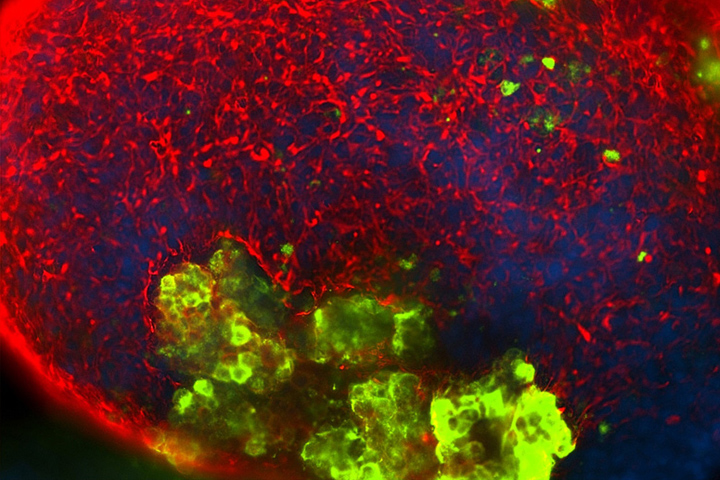Adding a New Drug to Standard Treatment for Metastatic Pancreatic Cancer

Courtesy of Christina Tu/Sue & Bill Gross Stem Cell Research Center, UC Irvine
Will adding a new drug that inhibits cancer cells’ ability to renew themselves to standard treatment increase survival for patients with metastatic pancreatic cancer?
A clinical trial tests the combination of standard chemotherapy plus a new drug that affects cancer stem cells.
Affecting the Renewability of Cancer Stem Cells
Stem cells have the ability to self-renew and differentiate into mature, healthy cells. Unlike normal stem cells, cancer stem cells mature into cancer cells. Cancer stem cells depend on different signaling pathways. The drug napabucasin (BBI-608) targets one of these pathways, inhibiting the growth of cancer stem cells. This reduces the recurrence and spread of cancer to other locations in the body.
Does the New Drug Napabucasin Affect Disease Progression?
Along with napabucasin, standard treatment for metastatic pancreatic cancer (gemcitabine and nab-paclitaxel) will be given to participants. Gemcitabine is converted into two metabolites that cause cell death. One reduces the number of proteins available to make DNA; the other shortens the DNA strands. Nab-paclitaxel inhibits cell division and promotes cell death.
Participants in this trial are randomly assigned to one of two groups. One group will receive the experimental drug napabucasin (BBI-608) along with standard treatment of gemcitabine and nab-paclitaxel. The other group will receive the standard treatment only. Researchers are looking at overall survival for participants, and whether the combination halts the progression of the cancer.
We encourage you to consult your physicians for clinical trials that may be right for you. The website ClinicalTrials.gov provides more details about this trial as well as many others. You can visit the Let’s Win Trial Finder for a listing of all active pancreatic cancer clinical trials.
This trial is now complete.





